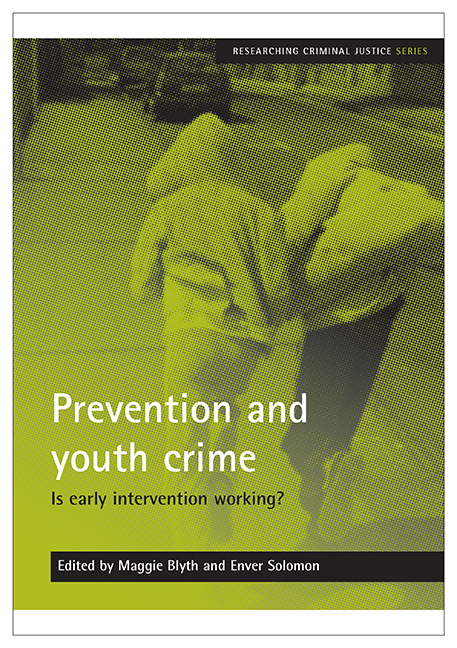Book contents
- Frontmatter
- Contents
- Foreword
- Acknowledgements
- List of abbreviations
- Notes on contributors
- Introduction
- 1 Integrated or targeted youth support services: an essay on ‘prevention’
- 2 Intervening in gang-affected neighbourhoods
- 3 Family intervention projects and the efficacy of parenting interventions
- 4 Early intervention and prevention: lessons from the Sure Start programme
- 5 Attachment research and the origins of violence: a story of damaged brains and damaged minds
- 6 Early intervention in the youth justice sphere: a knowledge-based critique
- 7 European perspectives on prevention
- Conclusion
1 - Integrated or targeted youth support services: an essay on ‘prevention’
Published online by Cambridge University Press: 25 March 2023
- Frontmatter
- Contents
- Foreword
- Acknowledgements
- List of abbreviations
- Notes on contributors
- Introduction
- 1 Integrated or targeted youth support services: an essay on ‘prevention’
- 2 Intervening in gang-affected neighbourhoods
- 3 Family intervention projects and the efficacy of parenting interventions
- 4 Early intervention and prevention: lessons from the Sure Start programme
- 5 Attachment research and the origins of violence: a story of damaged brains and damaged minds
- 6 Early intervention in the youth justice sphere: a knowledge-based critique
- 7 European perspectives on prevention
- Conclusion
Summary
Introduction
There is a lot of mischief within the debate on the respective merits and effectiveness of ‘universal’ versus ‘targeted’ services – of any kind. This is, of course, not a new debate; it has been around since the beginning of state-provided welfare services. Two burning issues have always informed that debate: one is concerned with the best use of scarce resources, the other with reaching the ‘target’ group. The two are intertwined: too much prescription and expectation about ‘measuring’ how effectively resources have been used is likely to produce what is sometimes described as ‘perverse behaviour’, in that providers will cherry-pick from within a broad target group (or even outside it) in order to optimise their chances of fulfilling the criteria on which they are being measured. This is what has been referred to, somewhat facetiously but with considerable accuracy, as ‘hitting the target but missing the point’.
The point is that, in relation to any ‘target’ group but here in the context of young people, services should actually reach and have the desired impact on them. Over the past decade or so, this has produced a particularly polarised debate between, on the one hand, some sections of what might be called the traditional youth service, which has continued to advocate for universality, and, on the other hand, new policy approaches such as youth crime prevention. The latter makes its case on the basis of quasi-scientific assessments of ‘risk’ in order to identify those who should be the priority recipients of its interventions. In England, the now somewhat discredited Connexions Service sought to find a path between the two, using the rather cleverly constructed mantra about providing a ‘universal service differentiated according to need’, thereby being accessible to all but focusing its practice at the sharp end on young people most in need of its support – which, in its policy context, were those young people not in education, employment or training (NEETs).
Beyond the rhetoric of Connexions, the battle lines have been drawn, with strategies for attack and defence on both sides. The universalists argue their moral high ground of voluntary engagement, educative and developmental intent, and person-centred approaches. They attack the opposition for labelling and stigmatising young people and, of course, for missing some of those most in need because they do not fall into technically constructed frameworks of assessment.
- Type
- Chapter
- Information
- Prevention and Youth CrimeIs Early Intervention Working?, pp. 9 - 20Publisher: Bristol University PressPrint publication year: 2008



